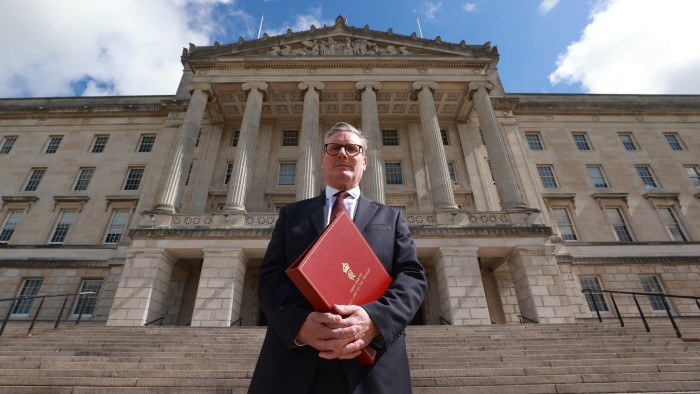The writer is a member of the Northern Ireland Legislative Assembly, where he is leader of the opposition
Politics can move with strange and brutal symmetry. Five years ago last month, Boris Johnson’s Brexit deal was effectively ratified by a decisive election that gave him a majority many thought would keep him in power for a decade. We know what happened next. His Irish counterpart Leo Varadkar, who was critical in concluding the deal’s special arrangements for Northern Ireland, is also out of office, though of his own volition. The other key player, then-EU negotiator Michel Barnier, found his short stint as French prime minister ended abruptly in December.
All these men are gone but the most contentious part of the deal they signed remains: the protocol, later revised by the so-called Windsor framework. Last month, members of the Legislative Assembly in Stormont voted to extend core provisions that keep Northern Ireland inside parts of the EU single market in order to keep the border in Ireland as invisible as possible. This so-called democratic consent vote was a late addition to Johnson’s Brexit deal, partly to salve unionist disquiet.
In the end, the vote passed decisively but without “cross-community” consent — unionists did not support it. However, Northern Ireland now has a useful combination of ingredients that have not been present for some time: a functioning devolved government at home (even if its ministers are not particularly cohesive) and newly elected governments in Dublin and London committed to rebuilding an Anglo-Irish relationship racked by Brexit. With privileged access to two of the world’s most important markets, Stormont should exploit its position to maximum advantage.
Not only are we bound by EU law in relation to customs and goods regulation, but Northern Ireland’s citizens are also EU citizens by birthright, should they choose to exercise that right via Irish citizenship. A large proportion have always availed themselves of this for reasons of identity, but an increasing number now acquire Irish passports because they want the opportunities — and convenience — of EU citizenship for themselves and their children.
This is precisely why we should be ambitious in enhancing Northern Ireland’s distinctive relationship with the EU. Keir Starmer’s government — which aspires to a refreshed UK-EU partnership but seems unclear about what exactly this entails — should be unafraid to embrace distinctive rights for the region. Northern Ireland would benefit from a louder voice in Brussels — ideally via a form of observer status in the EU parliament. We would also gain from increased participation in youth mobility programmes such as Erasmus and continuing use of the Peace plus fund as a model for participation in other EU funding streams, including the potential underwriting of infrastructure projects via the European Investment Bank. An EU office in Belfast would help local businesses lobby the European Commission about the practical operation of EU rules. As the official opposition at Stormont, our party — the Social Democratic and Labour party — presented these proposals in Brussels last month.
Some of these ideas will be anathema to hardline Brexiters and their fellow travellers with hardline unionism, the latter being both the loudest cheerleaders for and biggest losers from a hard Brexit. For years, our politics was poisoned by extreme actors willing to use extraordinary means to protest against the so-called Irish Sea Border. None of that nonsense should deter anyone in London, Brussels or Dublin from building on the opportunities Northern Ireland now has. We might even serve as an example for repaired relations between the UK and EU more broadly.
To put it plainly, if Northern Ireland is prevented from embracing its unique position between the UK and EU, it will only hasten the moment when another unique and fundamental right is exercised: a referendum to rejoin the EU via a new Ireland.



